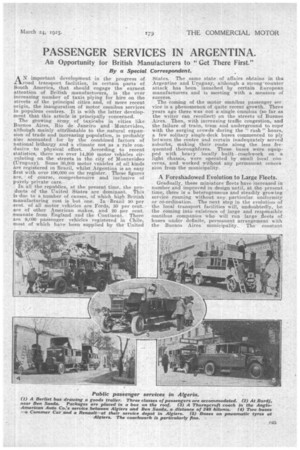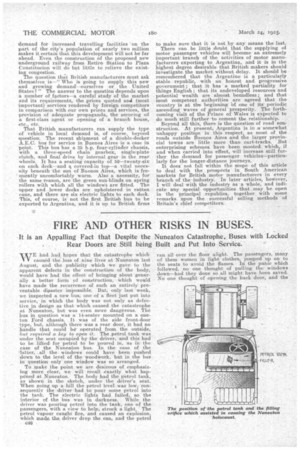PASSENGER SERVICES IN ARGENTINA.
Page 29

Page 30

If you've noticed an error in this article please click here to report it so we can fix it.
An Opportunity. for British Manufacturers to "Get There First."
By a Special Correspondent. AN important development in the progress of road transport facilities, in certain parts of South America that should engage the earnest attention of British manufacturers, is the ever increasing number of taxis plying for hire on the streets• of the principal cities and, of more recent, origin, the inauguration of motor omnibus services in populous centres. It is with the latter development that this article is principally concerned. The growing army of taxicabs in cities like Buenos Aires, Rio de Janeiro and Montevideo, althoUgh mainly attributable to the natural expansion of trade and increasing population, is probably also accounted for by the combined factors of national lethargy and a climate not as a rule conducive to physical effort. According to recent statistics, there are over 14,200 motor vehicles circulating on the streets in the city, of Montevideo (Uruguay). Some 30,000 motor vehicles of all kinds are registered in Brazil, whilst Argentina is an easy first with over 100,000 on the register. These figures are, of course, comprehensive and inclusive of purely private cars.
In all the republics, at the present time, the products of the United States are dominant. This is due to a number of causes, of which high British manufacturing cost is but one. In -Brazil 50 per cent. of all motor vehicles are Fords, 30 per cent. are Of other American makes, and 20 per cent. emanate from England and the Continent. There are 9,000 passenger vehicles registered in Chile, most of which have been supplied by the United States. The same state of affairs obtains in the Argentine and Uruguay, although a strong'counter attack has been launched by certain European manufacturers and is meeting with a measure of success. •
The coming of the motor omnibus passenger service is a phenomenon of quite recent. growth. Three years ago there was not a• single omnibus (so far as the writer can recollect) on the streets of Buenos Aires. Then, with increasing traffic congestion, and the failure of train, tram and underground to cope with the surging crowds during the "rush" hours, a few Solitary single-deck buses commenced to ply between the centre and certain inadequately served suburbs, making their route along the less frequented thoroughfares. These buses were equip ped with heavy locallY. -coaphwork on a light chassis, were operated by small local concerns, and worked without any permanent conces sion from the municipality.
A Foreshadowed Evolution to Large Fleets.
Gradually, these miniature fleets have increased in number and improved in design until, at thepresent time, there is a heterogeneous and steadily growing service running without any particular uniformity or co-ordination. The next step in the evolution of the local transport facilities will, undoubtedly, be the coming into existence of large and responsible omnibus companies who will run large fleets of buses under definite, permanent arrangement with the Buenos Aires municipality. The constant demand for increased travelling facilities on the part of the city's population of nearly two million makes it certain that this development will not be far ahead. Even the construction of the proposed new underground railway from Retiro Station to Plaza Constitucion will do but little to relieve the existing congestion.
The question that British manufacturers must ask themselves is—" Who is going to supply this new and growing demand—ourselves or the United States ? " The answer to the question depends upon a number of factors—a careful study of the market and its requirements, the prices quoted an (most important) services rendered by foreign competitors in comparison with our own prices and services, the provision of adequate propaganda, the securing of a first-class agent or opening of a branch house, etc. etc. That British manufacturers can supply the type of vehicle in local demand is, of course, beyond question. The recent shipment of a double-decker A.E.O. bus for service in Buenos Aires is a case in point. This bus has a 35 h.p. four-cylinder chassis, with a three-speed chain gearbox, single-plate clutch, and final drive by internal gear in the rear wheels. It has a seating capacity of 52—twenty-six on each deck—and a covered-in top—a vital necessity beneath the sun of Buenos Aires, which is fre' auently uncomfortably warm. Also a necessity, for the same reason, are the green sun-blinds on spring rollers with which all the windows are fitted. The upper and lower decks are upholstered in rattan cane, and there are six electric lights to each deck. This of course, is not the first British bus to be exported to Argentina, and it is up to British firms
to make sure that it is not by any means the last.
There can be little doubt that the supplying of motor passenger vehicles will become an extremely important branch of the activities of motor manufacturers exporting to Argentina, and it is in the highest degree desirable that British makers should investigate the market without delay. It should be remembered that the Argentine is a particularly stable republic, with an honest and progressive government ; that it has a marked partiality for things English ; that its undeveloped resources and potential wealth are almost boundless; and that most competent authorities are agreed that the country is at the beginning Of one of its periodic ascending waves of _general prosperity. The forthcoming visit of the Prince of Wales is expected to do much still further to cement the relationship.
Beyond all this, there is the question of road eonstruction. At present, Argentina is in ar somewhat unhappy positien in this respect, as most of the roads outside Buenos Aires and the larger provincial towns are little more than cart-tracks. But enterprising schemes have been mooted which, if and when carried into effect, will increase still further the demand for passenger vehicles—particularly for the longer-distance journeys. It does not fall within the scope of this article to deal with the prospects in South American markets for British motor manufacturers in every branch of the industry. In later artieleg, however, I will deal with the industry as -a whole, and indicate any special opportunities that may be open in the principal republics, together with some remarks upon the successful selling methods of Britain's chief competitors.
























































